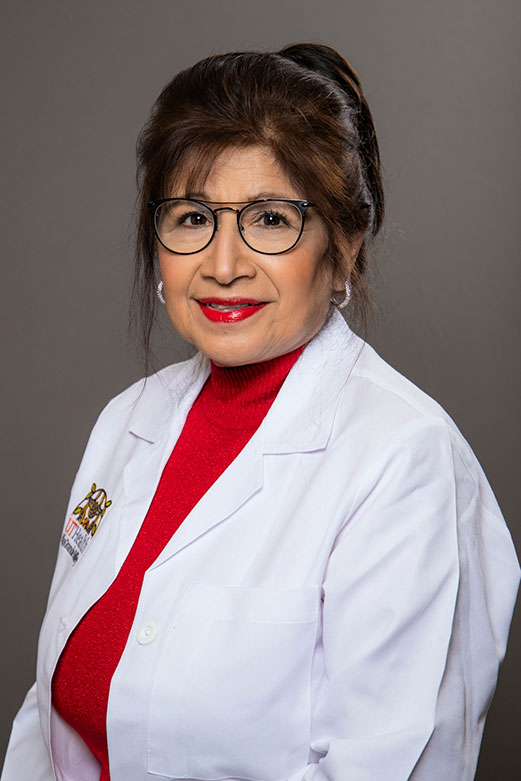- September 30, 2024
UTRGV Valley physician brings innovative depression therapy to Valley patients

September celebrates Women in Medicine and Science Month
By Heriberto Perez–Zuñiga
In Mexican culture, a “curandero” is a traditional healer known for using natural remedies and spiritual practices to treat ailments.
For Dr. Diana Chapa, chair of the Department of Neuro and Behavioral Health at the UTRGV School of Medicine and a psychiatrist at UT Health RGV, folk healing was her earliest exposure to medicine. Her grandfather was a curandero, and as she was growing up in a family of migrant farmworkers, she never imagined she would be where she is today.
“Our family worked in the fields and the odds were often stacked against us,” she said. “As a child, I dreamed of becoming a physician. My grandfather was a curandero, and the idea of pursuing medicine was always there, but I frequently heard that it wasn’t a path for women.”
So, she initially chose social work as a more societally acceptable career. But her perspective shifted dramatically after an experience with one of her clients.
“In one of my social work roles in Arizona, I had the opportunity to drive a patient to see a psychiatrist,” Chapa said. “The patient was living with schizophrenia, and the treatment they received was disheartening. The physician barely asked any questions, showed little concern, and simply wrote a prescription before sending us on our way. I remember thinking it was unacceptable and things needed to change.”
That was her turning point. Today, Chapa’s career is dedicated to advancing mental healthcare and pioneering innovative treatments in the Rio Grande Valley.
DEPRESSION: ‘BIOLOGICAL ILLNESS, NOT A SIGN OF WEAKNESS’
The unfortunate reality, Chapa said, is that many patients in historically underserved communities like the Valley suffer due to a lack of access to care. Her efforts led her to be one of the first psychiatrists to bring Transcranial Magnetic Stimulation (TMS) therapy to the Valley for residents dealing with depression.
TMS therapy, a non-invasive procedure that uses magnetic fields to stimulate nerve cells in the brain, offers a promising alternative for patients who have not responded to traditional treatments.
“This is an option for patients with severe depression who haven’t found relief with traditional medication and therapy,” Chapa said. “With TMS, we can now offer an FDA-approved treatment here in the Valley that has shown positive results.”
Studies show that 50% to 60% of patients who have not responded to other treatments see improvement with TMS, and about one-third achieve complete remission.
“Depression is a chronic illness that affects not only the individual but also the entire family. Our community here deserves access to all available treatment options. Patients with chronic illnesses like severe depression should have access to every possible treatment, just as we would for diabetes, heart disease, or cancer,” she said.
“It’s crucial to recognize that depression is a biological illness, not a sign of weakness. If research shows that treatments like TMS can significantly improve patients’ lives, we owe it to our community to provide these options,” she said.
Dr. Michael Hocker, dean of the UTRGV School of Medicine and senior vice president of UT Health RGV, said Chapa has been crucial in bringing this treatment to Valley residents who need it most.
“We’re very grateful that we have Dr. Chapa on our team, and her work is helping transform mental healthcare in the Valley,” Hocker said. “The results of TMS therapy have been remarkable. It’s incredible to see how this treatment is providing much-needed relief for patients and their families who have been struggling with severe depression.”
With the addition of upgraded equipment, Chapa said, TMS therapy also can be used to treat a variety of other illnesses, including obsessive-compulsive disorders (OCD), migraine and even post-traumatic stress disorder (PTSD).
MEDICAL JOURNEY
As she thinks back all those years ago to the first patient she saw in need of care, Chapa said, the journey to improving mental health in her community has been deeply personal.
“I clearly remember sitting in one of my classes, discussing readings about underrepresented and disadvantaged groups who often don’t make it,” she said. “At that moment, I thought, ‘They’re talking about my life and my family. Given the odds, I shouldn’t even be here.’ It was a sobering realization that many people like me don’t typically reach this level of education.”
Navigating the medical field without much guidance proved to be a difficult challenge, she said, but one that she knew could be overcome with perseverance and belief in herself.
Despite the many obstacles she faced to get to where she is today, Chapa said, she is grateful for her journey.
She emphasized the importance of self-belief, and said those considering a career in medicine should always reach out for support, particularly women who might face additional barriers.
“My advice is to not second-guess yourself. Give yourself a chance right from the beginning. If you believe you can succeed, ask yourself, ‘Why not me?’” Chapa said.
“Reach out to your doctor, school counselor, or university. Seek support from departments like psychiatry and our UT Health RGV clinics. We are here to support you, to be role models and to provide guidance. If we can do it, so can you,” she said.

